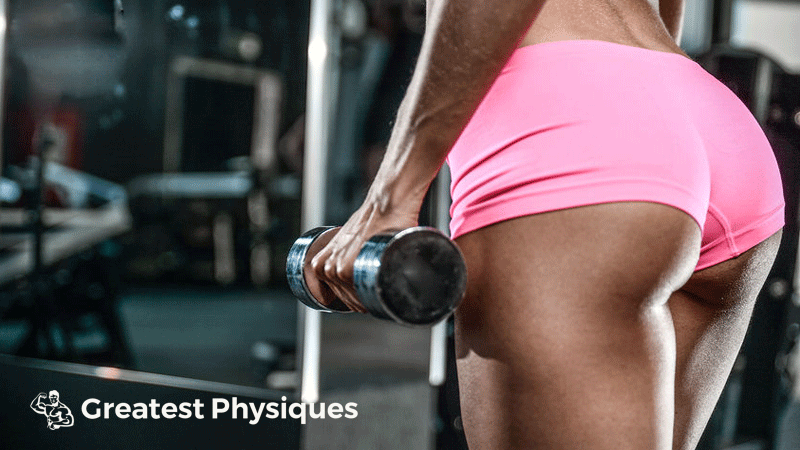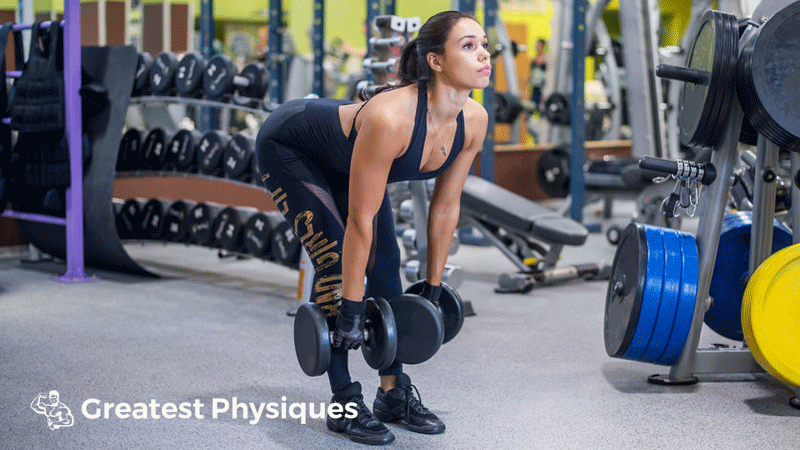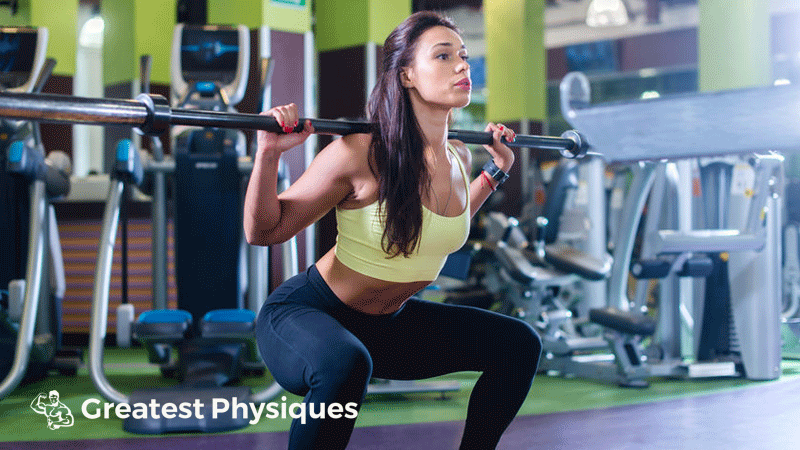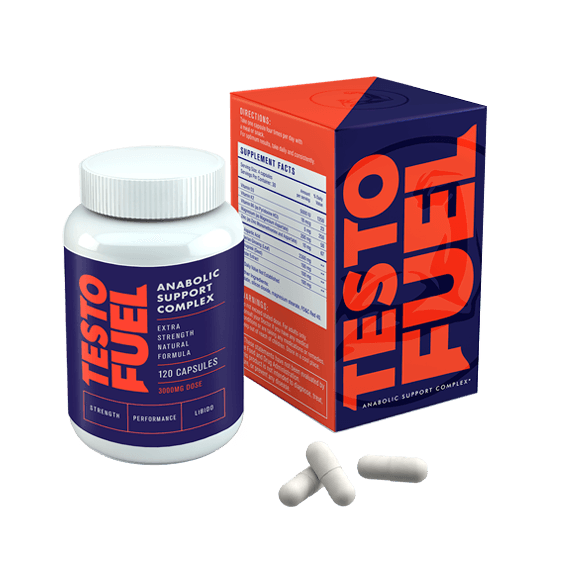
Use this workout guide to tone, tighten, lift and build your booty. A more confident and athletic you is only 12 weeks away.
One of the coolest shifts in fitness over the past couple of years is the emerging quest for a big butt. Gone are the worries about literally ‘exercising your ass off’. Instead, it’s trendy to fill your gym leggings with a big round butt.
Now it’s all about shape and curves. Bigger is better.
In this detailed guide we take you through everything you need to know about targeting your booty. If you’re a beginner that wants to construct a more daring derriere, this is the right place to be.
The curves you build here are guaranteed to get the attention you deserve.
It’s not just a simple list of exercises. This 12-week booty builder is a science-led program specifically designed your expert panel of trainers.
All you have to do is follow it.
Let’s get going…
What does this program cover?
| Goal: | Muscle building |
| Aimed at: | Intermediate to advanced level women |
| Program duration: | 12 weeks |
| Workout duration: | 45-60 minutes |
| Equipment needed: | Barbell, dumbbell, kettlebell, body weight, resistance machines |
How to Get a Bigger Booty
There’s an endless number of butt building workouts on the internet. The problem is that many of them don’t really hold true to the science of good training.
They seem to just throw in a random list of booty exercises and hope for the best.
Either that or it’s a grueling series of complicated exercises that leave you unable to sit down for a week. After all, you’re here because you want a booty program for beginners.
That’s where we come in.
This guide is more than just a mix of fancy looking exercises. It’s a program designed by experienced physique coaches and trainers that guarantees you results.
Half of the battle when it comes to building a muscle is understanding how the muscles work in the context of muscle physiology.
And while we’re not here to bore you with a biology lesson, there are some important points you need to know. Once you understand the basics you’ll even be able to design your own workout guide after you’ve finished this one.
Who knows, maybe your workout guide will be the one people are looking at next?
What Do Your Glutes Even Do?
You might not be aware of this, but if you take the surface area or even volume as a marker, your butt is the biggest muscle in your body.
The proper name for your butt is the gluteals. And it’s actually a group of muscles.
- Gluteus maximus – this is the largest of the gluteals and is responsible for extending your hip behind your body (imagine pushing your leg as far behind you as you can, a bit like a push-off in ice skating). It also helps you clench your butt cheeks together by pulling your knees outward – a movement called external rotation.
- Gluteus medius – this is a fairly small muscle located on the outside of your hip and lives under your glute maximus. Its main role is to assist the larger glute muscles in external rotation, but also abducts your hip – it moves your leg out to the side of your body.
- Gluteus minimus – this secondary muscle supports your medius in abducting your hip. It also helps to stabilize your hips when you’re standing on one leg.
What’s the take home message from this?
Well, if you’re truly aiming to build a better booty you need to target the muscles from different angles and with different exercises.
It’s a complex muscle group that won’t be targeted with just squats.
You need to use exercises that extend or abduct your hips and rotate your thighs. You need to throw in exercises where both legs are on the floor at the same time, and also single leg stuff too.
The more variety the better.

The Role of the Glutes
By now you’ll realize that your glutes are a complex group of muscles. It connects your lower body to your upper body and has muscle fibers that run in a number of different directions.
Because of the way that these fibers run, you can target specific ones by changing exercise selection. Some will hit the upper glutes, some the outer thigh and butt, and some the lower area that ties into your hamstrings.
If you’re into your science then you’ll be pleased to know that different exercises can target the superficial sacral, deep ilium and deep sacral areas because of their unique muscle fiber compartments.
Basically, any good booty building program will cover all bases and attack your ass from different positions.
You need to vary the rep range to grow your glutes
Not only does a well-planned lower body program hit the muscles from a variety of angles; it also appreciates the type of muscle fibers that make it up.
The gluteals are under-studied when it comes to ‘architecture‘ research. But from what we know, they are made up of mixed muscle fibers.
It’s not an all-out power muscle. Or an endurance muscle. It’s mixture of both.
Note: Research papers suggest that your gluteals are 68% slow-twitch endurance and 32% fast-twitch strength fibers [1].
Targeting this muscle group with a variety of high reps with low weight and heavy weights with low reps are the only way to help it build.
Sticking with the same sets and reps won’t get you to where you need to be.
A big, round, tight booty is all about stimulating the muscle. And as a beginner you’ll learn more about your body by varying the stimulus and challenge in each workout.
Use the primary patterns
When it comes to hitting your glutes effectively you need to use a variety of ‘patterns’. These are types of movements that follow the same sequence of motions, but the equipment or technique differs slightly.
Take the squat for example. You can back squat, front squat, goblet or overhead. But they all use the same lower body pattern.
When you’re training for a bigger booty, these are the patterns you need to follow:
- Squat – bending at the hips and knees at the same time.
- Lunge – single leg work that involves bending and extending the knee and hip. Often called split squats.
- Hinge – keeping the knees in a fixed position and driving the hips back.

- Key Point: Your gluteals are a multi-functional muscle group that are stimulated with both light and heavy weights.
Bigger Booty Workout Program
The great thing about this lower body workout plan is that it doesn’t ruin your existing training split.
It fits into any program as a standalone workout so all you have to do is continue with your upper body workouts as normal and use the booty builder workout in place of your leg days.
If you currently train a full-body plan then you might want to consider an upper and lower body split. This way you won’t do too much.
And if you’re a true beginner and currently not training at all, you can just follow this program.
Weeks 1-3: Building the Beginner Booty
We’re focusing on a lot of body weight movements here with high reps.
Part of the long-term plan with this 12-week program is that you’ll not only build a strong and shapely butt, you’ll also optimize performance.
You can’t fire a cannon from a canoe. Laying down safe movement patterns and effective technique are an important part of any muscle building program… your butt is no different.
In the first couple of weeks you’ll be teaching your body the right movements. This’ll lay down some real foundations and keep you driving forward with momentum as you progress into the later weeks.
And just to make sure you spark that muscle building process early on, we’re asking you to complete high reps here.
You’ll be triggering a lot of lovely acid build up in your glutes, but that’ll really get your muscles growing.
You’ll be performing 2 different workouts per week here. If you want to take it up to 3 sessions you can simply repeat workout 1 or 2.
Weeks 4-8: Let’s get lifting some weight
In this second phase of training you’ll be ramping up the weight, lowering the reps and zoning in on targeted growth.
You’ll also be switching things up with some new and exciting exercises that challenge both your body and your skill level. You’ll notice the difference right away when it comes to difficulty. But after 3 easier weeks you’ll be ready for a new challenge.
Having access to a gym is important here because we really want you to load up and challenge the muscles with weights.
In this phase you’ll be hitting your butt from as many different angles as possible. You’ll be using squat, lunge and hinging patterns for absolute fun. Embrace it!
We’re taking your program up to 3 workouts per week here – your glutes can handle the increase in volume easily if you’ve done the prep work. Start with 2 sets per exercise to begin with and increase to 3 when you feel ready.
Weeks 9-12: Getting strong and shapely
Where can we go from phase 3 you might be asking yourself?
Well the answer is to dial in on the only stone left unturned – all out strength and power training.
Don’t worry, not every exercise will be heavy. But remember, your glutes are multi-functional. If you don’t lift heavy for some of the exercises you won’t stimulate maximal growth.
The goal here is to go hard and see what you’ve got.
You’ve worked hard to learn the patterns and you’ve come a long way since week 1. Take a look in the mirror – you’ve already got some appreciable gains. Let’s just go for it now.
With 4 tough strength workouts to get through we suggest that you tone down any cardio or upper body workouts you might be doing a touch. This way you can focus better on your booty.
It’s time to zone in on the ‘meat’ of booty training.
Here we go…
The Program: Lower Body Muscle Building for Glutes
Weeks 1-3: Building the Beginner Booty
| Number | Exercise | Reps | Sets | Rest period |
|---|---|---|---|---|
| 1 | Goblet squat | 15-20 | 3 | 2-3 minutes |
| 2 | Inchworms | 15-20 | 3 | 2-3 minutes |
| 3 | Press-ups (full position or on knees) | 15-20 | 3 | 2-3 minutes |
| 4 | Split squat | 15-20 each side | 3 | 2-3 minutes |
| 5 | Mountain climbers | 15-20 each side | 3 | 2-3 minutes |
| Number | Exercise | Reps | Sets | Rest period |
|---|---|---|---|---|
| 1 | Prisoner squat | 15-20 | 3 | 2-3 minutes |
| 2 | Body weight renegade row | 15-20 each side | 3 | 2-3 minutes |
| 3 | Lateral split squat | 15-20 each side | 3 | 2-3 minutes |
| 4 | Glute bridge | 15-20 | 3 | 2-3 minutes |
| 5 | Side plank | 30-60 seconds each side | 3 | 2-3 minutes |
Weeks 4-8: Let’s get lifting some weight
| Number | Exercise | Reps | Sets | Rest period |
|---|---|---|---|---|
| 1 | Back squat | 8-15 | 2-3 | 2-3 minutes |
| 2 | Lying leg curl | 8-15 | 2-3 | 2-3 minutes |
| 3 | Dynamic lunge | 8-15 each side | 2-3 | 2-3 minutes |
| 4 | DB Shoulder press | 8-15 | 2-3 | 2-3 minutes |
| 5 | Leg extension | 8-15 | 2-3 | 2-3 minutes |
| 6 | KB Sumo squat | 8-15 | 2-3 | 2-3 minutes |
| 7 | Side-lying clams | 8-15 each side | 2-3 | 2-3 minutes |
| 8 | Lat pulldown | 8-15 | 2-3 | 2-3 minutes |
| Number | Exercise | Reps | Sets | Rest period |
|---|---|---|---|---|
| 1 | Goblet squat | 8-15 | 2-3 | 2-3 minutes |
| 2 | Romanian deadlift | 8-15 | 2-3 | 2-3 minutes |
| 3 | Rear lunges | 8-15 each side | 2-3 | 2-3 minutes |
| 4 | Chest press | 8-15 | 2-3 | 2-3 minutes |
| 5 | Standing calf raise | 8-15 | 2-3 | 2-3 minutes |
| 6 | Hyperextensions | 8-15 | 2-3 | 2-3 minutes |
| 7 | Seated calf raise | 8-15 | 2-3 | 2-3 minutes |
| 8 | Low row | 8-15 | 2-3 | 2-3 minutes |
| Number | Exercise | Reps | Sets | Rest period |
|---|---|---|---|---|
| 1 | Zercher squat | 8-15 | 2-3 | 2-3 minutes |
| 2 | Lying leg curl | 8-15 | 2-3 | 2-3 minutes |
| 3 | Bulgarian split squat | 8-15 each side | 2-3 | 2-3 minutes |
| 4 | Triceps rope extensions | 8-15 | 2-3 | 2-3 minutes |
| 5 | BB or DB Deadlift | 8-15 | 2-3 | 2-3 minutes |
| 6 | Leg press | 8-15 | 2-3 | 2-3 minutes |
| 7 | Ab curl | 8-15 | 2-3 | 2-3 minutes |
| 8 | DB hammer curl | 8-15 | 2-3 | 2-3 minutes |
Weeks 9-12: Getting strong and shapely
| Number | Exercise | Reps | Sets | Rest period |
|---|---|---|---|---|
| 1 | BB Hip thrust | 8-10 | 4-6 | 2-3 minutes |
| 2 | DB High step-ups | 12-15 each side | 4-6 | 2-3 minutes |
| 3 | Romanian Deadlift | 8-10 | 4-6 | 2-3 minutes |
| 4 | RKC Plank | 8-10 | 4-6 | 2-3 minutes |
| Number | Exercise | Reps | Sets | Rest period |
|---|---|---|---|---|
| 1 | Deadlift | 8-10 | 4-6 | 2-3 minutes |
| 2 | DB Walking lunges | 8-12 each side | 4-6 | 2-3 minutes |
| 3 | Lying leg curl | 8-10 | 4-6 | 2-3 minutes |
| 4 | Mountain climbers | 15-20 per side | 4-6 | 2-3 minutes |
| Number | Exercise | Reps | Sets | Rest period |
|---|---|---|---|---|
| 1 | Back squat | 8-10 | 4-6 | 2-3 minutes |
| 2 | Dynamic Lateral lunges | 8-12 each side | 4-6 | 2-3 minutes |
| 3 | Leg Press | 8-10 | 4-6 | 2-3 minutes |
| 4 | Cable pull-through | 15-20 | 4-6 | 2-3 minutes |
References
-
Sĭrca, A et al. Selective type II fibre muscular atrophy in patients with osteoarthritis of the hip. J Neurol Sci. 1980; 44(2-3): 149-59




Comments are closed